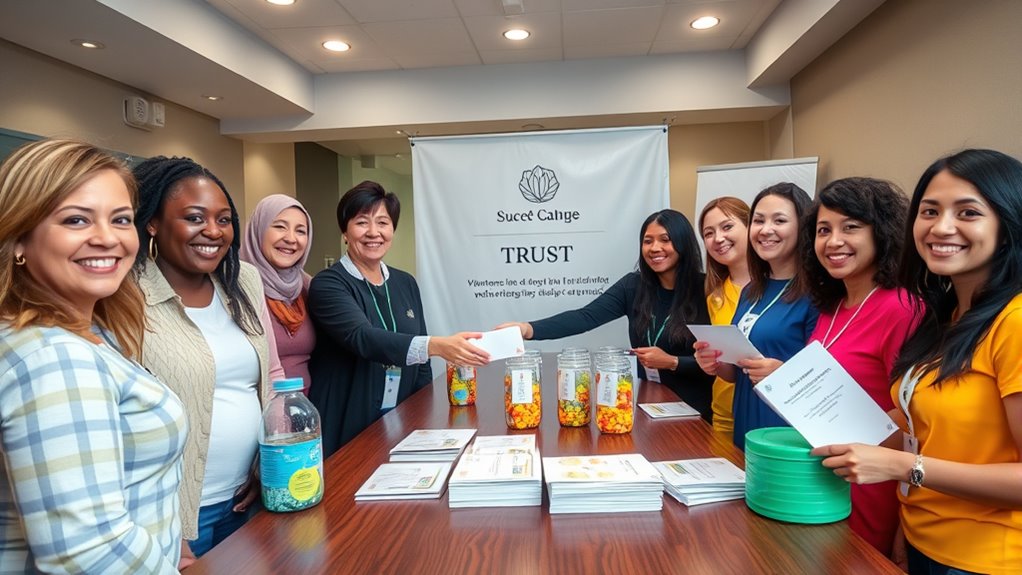Fundraising with integrity means you conduct your efforts honestly, transparently, and respectfully. You should establish clear ethical guidelines, communicate openly about fund use, and always safeguard donor privacy. Recognize contributors sincerely without exaggeration, and avoid high-pressure tactics. By fostering trust and accountability, you build lasting relationships with donors and volunteers. Upholding these principles ensures your organization maintains a strong reputation. Keep exploring to learn more about creating ethical, effective fundraising practices that truly honor your supporters.
Key Takeaways
- Maintain honesty and transparency in all fundraising communications and activities.
- Recognize donors and volunteers sincerely, respecting their privacy and contributions.
- Clearly disclose fund allocation and usage to build trust and accountability.
- Ensure ethical recruitment and management of volunteers, promoting fairness and voluntariness.
- Regularly review and update ethical guidelines, fostering a culture of integrity and continuous improvement.
Establishing Clear Ethical Guidelines

How can your organization build trust and credibility in fundraising? Establishing clear ethical guidelines is vital. First, create policies around volunteer recognition to ensure every contributor feels valued and appreciated, fostering transparency and integrity. Recognize volunteers genuinely, avoiding favoritism, and highlight their efforts publicly in line with your ethical standards. Additionally, develop detailed social media policies that guide how your organization interacts online. These policies should emphasize honesty, respect, and responsible communication, preventing potential misrepresentation or misinformation. Clear guidelines demonstrate your commitment to ethical conduct, build trust with donors and volunteers, and set a consistent standard for all fundraising activities. When everyone understands and adheres to these principles, your organization’s reputation for integrity will strengthen considerably.
Ensuring Transparency in Fund Allocation

Ensuring transparency in fund allocation is essential for maintaining trust and credibility with your donors and stakeholders. When you clearly communicate how funds are distributed, donors feel confident their contributions make a real impact. Recognize donors appropriately through donor recognition programs, showing appreciation and accountability. During fundraising events, be transparent about how proceeds will be used, giving attendees confidence in their support. Keep detailed records of expenses and allocations, and share these reports openly, whether through newsletters or your website. This transparency demonstrates your commitment to integrity and builds long-term relationships. When donors see you’re honest about where their money goes, they’re more likely to continue supporting your cause and recommend your organization to others.
Building Trust Through Honest Communication

Building trust with your donors goes beyond transparent fund allocation; it relies on honest communication at every touchpoint. Authentic storytelling is essential—share real stories that reflect your organization’s impact genuinely, avoiding exaggeration or manipulation. This illustrates integrity and builds credibility. Additionally, cultural sensitivity plays a vital role; respect diverse backgrounds and perspectives, tailoring your messages to resonate authentically with different communities. When you communicate openly and thoughtfully, donors feel valued and confident in your mission. Consistency is key—keep your messages honest, clear, and respectful. By fostering genuine connections through storytelling authenticity and cultural sensitivity, you establish a foundation of trust that encourages long-term support and partnership. Honest communication isn’t just ethical; it’s essential for sustainable fundraising success.
Respecting Donor Privacy and Confidentiality

Respecting donor privacy and confidentiality is fundamental to maintaining trust and integrity in your fundraising efforts. When you handle sensitive information, imagine it as a precious asset that must be protected. Consider these key points:
- Always secure donor data to prevent breaches.
- Share donor recognition publicly only with explicit permission.
- Limit access to confidential information to authorized staff.
- Act swiftly to address any confidentiality breaches, showing your commitment to privacy.
Demonstrating Accountability and Responsibility

You need to show donors that you’re trustworthy by practicing transparent financial management and sharing clear reports. Using ethical fundraising strategies guarantees your organization stays honest and respects donors’ intentions. When you demonstrate accountability and responsibility, you build lasting trust that strengthens your organization’s integrity.
Transparent Financial Practices
Transparent financial practices are essential for earning donors’ trust and demonstrating accountability. When you share clear financial reports, you show exactly how funds are used, fostering confidence. To do this effectively, consider:
- Providing detailed budgets for fundraising events, so donors see where each dollar goes.
- Regularly updating supporters on financial progress and outcomes.
- Recognizing donors publicly through donor recognition programs, emphasizing their contributions’ impact.
- Ensuring all financial transactions are documented and accessible for review.
Ethical Fundraising Strategies
Building trust with donors goes beyond transparent financial reports; it also requires adopting ethical fundraising strategies that demonstrate accountability and responsibility. You can do this by genuinely recognizing donors’ contributions through meaningful donor recognition, which affirms their support. Engaging volunteers ethically strengthens your mission and shows transparency in how their efforts are valued. Consider this approach:
| Strategy | Impact |
|---|---|
| Honest donor recognition | Builds loyalty and trust |
| Volunteer engagement | Demonstrates respect and accountability |
| Clear communication | Ensures donors understand how funds are used |
| Responsible solicitation | Avoids pressure and maintains integrity |
Engaging Donors as Partners, Not Just Funders

By involving donors as active partners rather than just sources of funding, organizations foster deeper engagement and shared commitment to their mission. When you treat donors as collaborators, you create a sense of ownership and loyalty. Imagine:
Engaging donors as partners builds loyalty, trust, and lasting community commitment.
- Recognizing their contributions publicly, making them feel valued through donor recognition.
- Inviting them to participate in volunteer engagement activities, strengthening personal connections.
- Sharing updates that highlight their impact, reinforcing their role in your success.
- Listening to their feedback, demonstrating that their perspectives matter.
This approach transforms giving into a partnership, where donors see themselves as integral to your cause. It encourages ongoing support, trust, and a genuine sense of community—key ingredients for sustainable growth.
Avoiding High-Pressure Solicitation Tactics

While fostering genuine partnerships with donors encourages ongoing support, it’s equally important to respect their comfort levels during solicitations. Avoid high-pressure tactics that can lead to donor exploitation or feelings of coercion. Steer clear of deceptive marketing strategies that misrepresent your organization’s needs or impact, as these erode trust and damage your reputation. Instead, focus on transparent, honest communication that allows donors to make informed decisions at their own pace. Remember, pressuring someone into giving can backfire, creating resentment and skepticism. Respecting boundaries shows integrity and builds lasting relationships. By maintaining ethical solicitation practices, you demonstrate respect for your donors and uphold the trust essential for sustainable support.
Upholding Integrity During Fundraising Campaigns

Maintaining integrity during fundraising campaigns requires a clear commitment to honesty and transparency at every stage. You can foster trust by:
- Engaging donors honestly, showing how their contributions truly impact the cause.
- Using ethical storytelling to share authentic stories that resonate without exaggeration.
- Clearly explaining fund allocation, so donors see exactly where their money goes.
- Listening actively to donor feedback, demonstrating respect and openness.
Continually Reviewing and Improving Ethical Practices

Regularly reviewing your ethical practices helps guarantee your fundraising efforts stay honest and trustworthy. Keep an eye on how you recognize donors to ensure acknowledgment remains genuine and respectful. Also, evaluate your volunteer recruitment strategies to prevent any appearance of favoritism or coercion. Use the table below to track areas for improvement:
| Area | Action Step |
|---|---|
| Donor Recognition | Ensure recognition is sincere and transparent |
| Volunteer Recruitment | Promote fairness and voluntariness |
| Policies | Update codes of conduct regularly |
| Staff Training | Reinforce ethical standards consistently |
| Feedback | Gather input from stakeholders for improvement |
Frequently Asked Questions
How Can Organizations Handle Ethical Dilemmas in Fundraising?
When faced with ethical dilemmas in fundraising, you should prioritize donor privacy and uphold transparency standards. Always be honest about how funds are used, avoid misrepresentation, and respect donor confidentiality. If you’re unsure, seek guidance from your organization’s policies or ethics committee. By maintaining these principles, you guarantee trust, foster long-term relationships, and navigate dilemmas responsibly, ultimately supporting your organization’s integrity and mission.
What Training Is Recommended for Staff on Ethical Fundraising?
Think of ethical fundraising as your compass, guiding you through tricky waters. You should train staff on donor privacy and transparency standards, much like a lighthouse illuminates safe passage. By understanding these principles, your team can confidently handle sensitive info, avoid conflicts of interest, and foster trust. Regular workshops, role-playing scenarios, and clear policies will empower your staff to uphold integrity and build lasting donor relationships.
How to Rebuild Trust After a Fundraising Ethics Breach?
When rebuilding trust after a fundraising ethics breach, you should prioritize donor transparency and ethical communication. Start by openly acknowledging the issue, apologize sincerely, and explain the steps you’re taking to prevent future problems. Keep donors informed with honest updates and demonstrate your commitment to ethical practices. Consistently practicing transparency and maintaining open, honest communication will help restore confidence and rebuild your organization’s integrity over time.
What Are Effective Ways to Recognize Donor Contributions Ethically?
Did you know 75% of donors say they’re more likely to give again when they feel genuinely appreciated? To recognize donor contributions ethically, prioritize transparent, sincere donor appreciation and ethical acknowledgment. Always guarantee your recognition aligns with their preferences and contributions, avoiding exaggeration or undue emphasis. Personalize your gratitude, use preferred communication channels, and respect privacy. Ethical acknowledgment builds trust, encourages repeat giving, and sustains your organization’s integrity and relationships.
How Do Cultural Differences Impact Fundraising Ethics?
Cultural sensitivities substantially influence fundraising ethics because they shape how you approach donors from diverse backgrounds. You need to respect local customs and traditions, which can vary widely across cultures. By understanding international standards and adapting your strategies accordingly, you build trust and avoid misunderstandings. Recognizing these differences ensures your fundraising efforts remain ethical, respectful, and effective, fostering genuine relationships with donors worldwide.
Conclusion
By embracing these ethical practices, you build a foundation as solid as a mountain, fostering trust and respect with every donor. When you prioritize transparency, honesty, and accountability, you turn fundraising into a partnership rooted in integrity. Remember, your commitment to ethical conduct is the lighthouse guiding your organization through the stormy seas of fundraising challenges, ensuring you navigate with honor and purpose—because lasting impact comes from doing what’s right, not just what’s easy.










